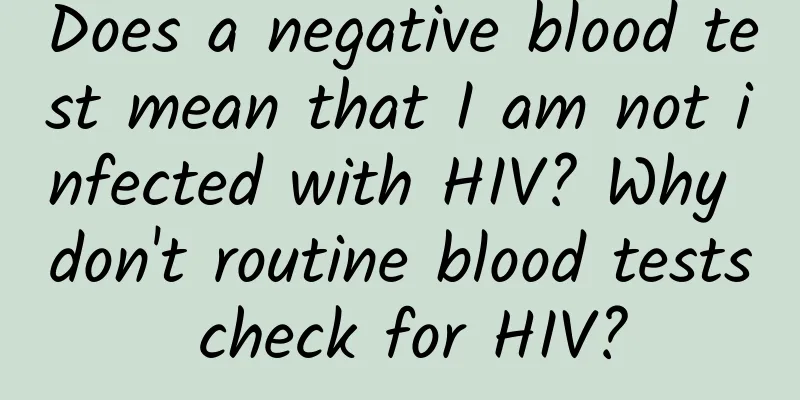Does a negative blood test mean that I am not infected with HIV? Why don't routine blood tests check for HIV?

|
When you suspect you may be infected with AIDS, you will first go for a blood test to see if you are infected, usually by negative or positive results. So if the blood test is negative, does it mean you are not infected? Why can't a routine blood test be used to detect AIDS? Does a negative blood test mean that you are not infected with HIV?If the blood test is negative, it is recommended to test again in three months. False negative test results can also occur, and the likelihood of a false negative depends on the time between your possible exposure to HIV and when you get tested, and the time it takes for seroconversion to occur. This is when your body starts to produce antibodies, which HIV tests look for anywhere from two weeks to six months after infection. Therefore, if you have had a negative HIV test within three months of your last exposure to HIV, it is recommended that you get tested again within three months of your initial screening. A negative result is only accurate if you have not been at risk for HIV infection in the past six months. Why don't routine blood tests check for HIV?Routine blood tests can be done in general hospitals, but hospitals that want to test for AIDS must have certain qualifications and need approval from higher authorities. In addition, general hospitals can only do HIV screening, that is, a preliminary judgment on whether HIV antibodies are positive, but they cannot confirm that you are infected with HIV, nor can they issue you a diagnosis report. A diagnosis report needs to be issued by a higher-level hospital, a disease control center, or a higher-level hospital. Routine blood tests mainly detect the components in the blood and analyze the components. Routine blood tests conducted in hospitals will only check whether there are changes in the blood components. For example, a decrease in red blood cells may be anemia, an increase in white blood cells may cause inflammation, etc. Routine blood tests can only simply determine whether the blood is infected with bacteria. Although infectious diseases such as AIDS are also tested through blood, they require special reagents for detection. Currently, the main method is to test whether there are HIV antibodies in the blood. If there are, there is HIV infection. If not, there is no HIV infection. Moreover, HIV is a Class B infectious disease stipulated by the state, which needs to be kept strictly confidential. Only qualified hospitals or institutions can conduct tests! How is AIDS spread?The main ways of transmission of AIDS include sexual transmission, blood transmission and vertical transmission. Sexual transmission is the main route of transmission in my country today. It involves transmission between opposite sexes and male-to-male sexual intercourse. Blood transmission includes transfusion of blood products carrying the HIV virus or sharing toothbrushes, razors, and tattoo tools with AIDS patients. Vertical transmission refers to mother-to-child transmission, where an infected mother infects her child during childbirth or breastfeeding. Of course, AIDS cannot be transmitted through droplets or normal contact. Normal contact with AIDS patients in daily life, such as shaking hands, hugging, and polite kissing, will not transmit AIDS. Because the incubation period of AIDS can be as long as several years or even longer, there are no clinical symptoms during the incubation period, but it can be transmitted to others at this time, so AIDS patients in the latent period are more dangerous. For our own safety, we must be self-disciplined and abide by sexual ethics; refuse drugs and cherish life; try not to use unnecessary blood products; do not use other people's razors, toothbrushes and other tools, and refuse to go to informal beauty salons for tattoos, earrings and other activities. |
<<: Why do we need to fast for blood draw? Can't we drink water when we fast for blood draw?
Recommend
What is the inflammation of leucorrhea
Women's secretions are also a symbol of femal...
Female genitals diagram
Women are one of the most beautiful things in the...
Gynecological Bartholin's gland cyst
Gynecological Bartholin gland cyst is one of the ...
If you have pain in your anus during your period, beware of endometriosis
In life, many women find that they have anal pain...
Picture of fetus in mother's belly
During the ten months of pregnancy, does the baby...
What's wrong with the leucorrhea that looks like blood?
Generally speaking, the color and properties of l...
The dangers of breast augmentation
Breasts are a woman's pride, especially in th...
How to dress for pregnant women in summer
During pregnancy, the pregnant woman's body s...
What foods are good for breast fibroids?
The treatment of breast fibroids is an issue that...
Can a couple get pregnant by rubbing against each other during menstruation?
Recently, the editor has received a lot of questi...
What should I do if my pregnancy reaction is particularly severe during pregnancy?
Many people will experience severe pregnancy reac...
Pregnancy dry stool blocked in anus
The topic of constipation may seem a bit unrefine...
What to do if a girl's menstruation does not come
Menstruation is a physiological phenomenon that o...
Causes of lower abdominal pain during ovulation
It is normal to have lower abdominal pain during ...









